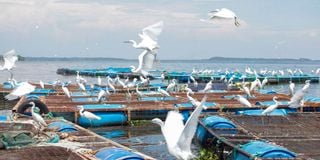Unceasing stench from Lake Victoria ruining businesses

Birds hover over cages carrying dead fish in Lake Victoria on October 20, 2022.
Residents of Kisumu have been grappling with the unbearable, nauseating stench that has enveloped beaches and spread to parts of the lakeside city in the last three months.
The foul smell, which has worsened in recent weeks, is beginning to take its toll on businesses and driving away customers.
Mr John Raila owns a boat on the busy Dunga beach and offers services to those wishing to take a ride in the lake. But his business has been disrupted after residents and visitors, who have been frequenting the beach to enjoy boat rides, kept away from the excursions because of the awful smell.
“We get most clients in the afternoon until late evening. But because of the bad smell from the lake, the number of people coming for boat rides has reduced,” narrates Mr Raila.
Residents have been holding their breath, while complaining about the foul smell emanating from the Winam Gulf.
Hospitality sector
The hospitality sector has not been spared. Dunga Lakeside Resort manager Geoffrey Nyanjong said that with lake pollution, some of the clients are not comfortable eating fish they suspect had been contaminated.
“Some clients are uncomfortable with the smell and they fear even consuming fish from the lake, arguing that most of the fish being sold in Kisumu might be contaminated by toxic substances in the lake,” said Mr Nyanjong.
Tourists being accommodated in hotels and resorts along the shore of the Winam Gulf have to stomach the bad smell.
Lake Victoria Tourism Association chairman Robinson Anyal said the lake offers business for the tourism sector in terms of cruise and water sporting activities.
“The status of the lake needs attention, but negative effects on tourism and hospitality around the lake are minimal and manageable,” said Mr Anyal.
Decomposition
Environmental experts have linked the foul smell to decomposing sunken water hyacinth, reeds and algae. For fishermen, the polluted water is hazardous and causing skin irritation.
Kichinjio Beach Management Unit chairperson Brian Opiyo said the water along the beach has become is not safe for use.
“It has a bad smell, when fishermen come into contact with this water, it causes irritation on the skin,” he said.
Kenya Marine and Fisheries Research Institute Kisumu (KMFRI) experts report that decomposition effect of debris could be the main cause of the foul smell.
A smelly lake harms the aquatic life and the surrounding environment. Sludge, the organic matter at the bottom of your pond or lake, needs oxygen to decompose. When the aquatic plant uses oxygen from the lake, it takes away the oxygen levels necessary for fish survival.
Sludge creates anaerobic bacteria, which produce Hydrogen sulfide, a dangerous, odorous gas.
KMFRI assistant director Christopher Aura said the ammonia gas being produced is due to the full decomposition process.
“This is due to increased temperature. This effect has also been causing low oxygen levels and fish deaths in the lake,” said Dr Aura.
He said decomposition of water plants is a seasonal process triggered by climate change.
“It happens without consistency as it depends on the increasing temperature, availability of debris such as water hyacinth, algae or reeds,” said Dr Aura.
The decomposition mainly affects fish in terms of oxygen depletion, which may cause fish kills both in the wild and in the cages. “For farmers engaging in cage fish farming, it may cause fish kills and it has done so during upwelling as anoxic water, deprived of oxygen, replaces the warm surface water of which fish gets suffocated and die.”
Dr Aura suggested that the dredging of the Mbita Causeway could help improve water circulation in the Winam Gulf that is the most affected.
“Based on the previous dredging in 2018, there was a lot of change in the water quality. If they dredge the causeway 12 metres deep, it might address the current population in the Winam Gulf,” he said.
Human activities
Kisumu Public Health director Fred Oluoch said the county is out to inspect if there are human activities that could ruin water quality.
“It is not the first time the lake is producing a bad smell. We are out to check if there’s also illegal dumping of waste into the lake,” said Mr Oluoch.
However, the National Environment Management Authority county director Tom Togo said they have been working to regulate lake pollutants.
Some of the factors that have led to the increase in lake pollution are agricultural activities, discharge of pesticides and industrial effluent.
“Regulation of the potential sources of the pollutant needs a multi-sector approach to improve water circulation,” said Mr Togo.




